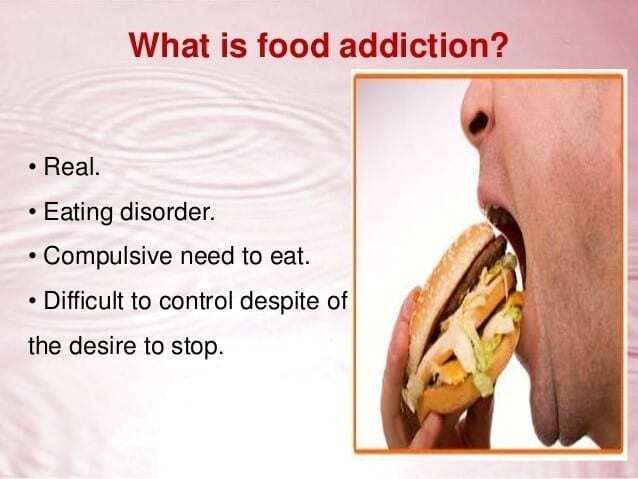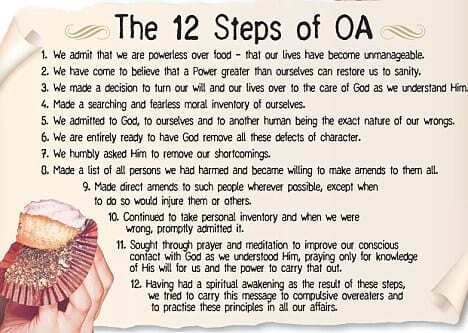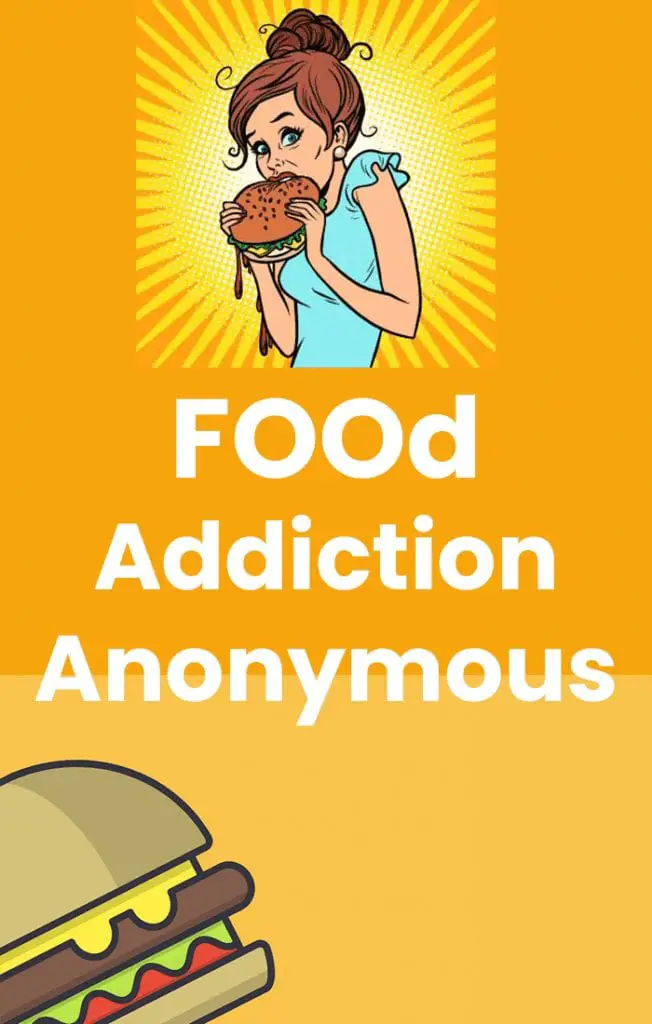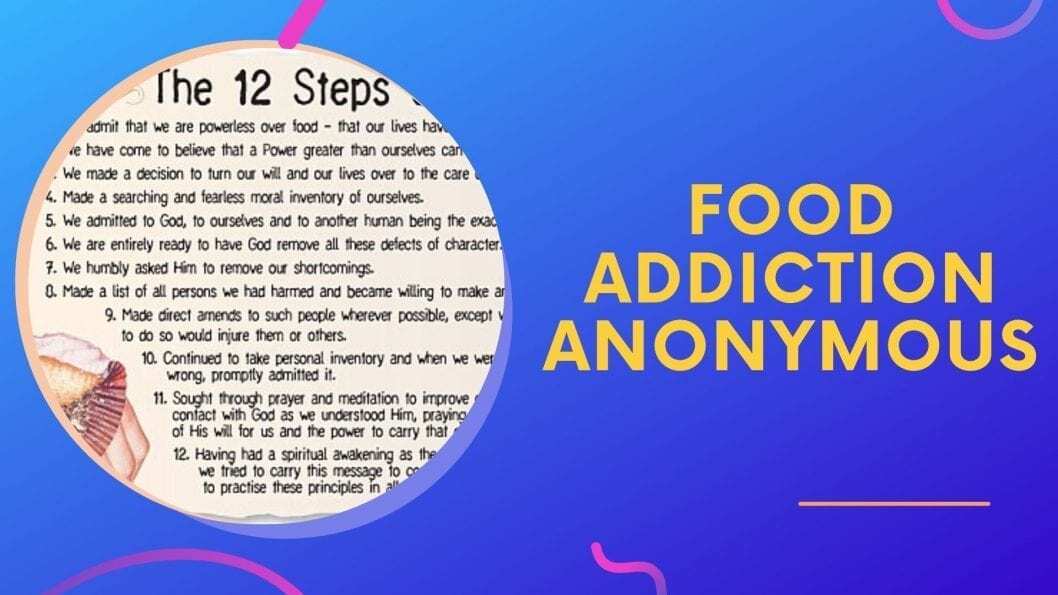Food addiction anonymous groups may be a great option for many people because while food addiction may not be a ‘medical term’, it is a problem for many people.
Many people, when they are just starting to learn about the world of food addiction, can be greatly served by being able to join one of various anonymous food addiction groups.
These food addiction anonymous groups like Overeaters Anonymous can be a great support system.
This blog post will discuss the definition of food addiction, Overeaters Anonymous and other groups like Food Addicts in Recovery, and provide a quick resource guide for you to find a meeting.
Let’s get started:
What is a food addiction?

Food Addiction does not technically exist in the Diagnostic and Statistical Manual of Mental Disorders (DSM-5).
The DSM-5 is the manual from the American Psychiatric association that, in the United States,defines specific criteria for diagnosing mental disorders.
Why is food addiction not in the DSM-5? It turns out the problem with food addiction being an ‘addiction’ is that we need food to eat everyday.
Unlike alcohol, we have to live with food.
You can free yourself from alcohol, however you can never free yourself from food.
(As an aside, alcohol and other substance addictions can have withdrawal symptoms like shaking and even death in some cases.
For alcohol addiction, here is a link with more information on getting help with a twelve-step meeting you may find nearby.
You can try using the search function in the link above and then find a meeting during a day that fits your schedule.
In my experience with these groups, you can also send an email the day before the meetings take place and you’ll have somebody answer your questions or give you more information.)
However for food addicts, there are no physical withdrawal symptoms that can cause death.
(And as another aside, usually food addiction refers to eating disorders that involve overeating. This means that while anorexia and other eating disorders may be serious and life threatening, I’m not referring to them in this section. Please note that anorexia is life threatening.)
Of course you can definitely get cravings, but this is different from the seizures, vomiting and death that can happen from withdrawing suddenly from some substances in other cases.
For these reasons, ‘food addiction’ is not a medical term.
Please note that just because food addiction is not a technical addiction, that by no means is meant to diminish the intense aspects of food addiction that mirror the symptoms of a real addiction.
Indeed, when you are in the grip of a food addiction, it does feel like you are addicted.
So it’s pretty normal for people to feel like they are food addicts, even if the term ‘food addiction’ isn’t officially accurate.
Next we’ll answer some questions about the 12-step food plan utilized by the most common food addiction anonymous group, Overeaters Anonymous.
In addition, there are other groups that fall within the grouping of “Food Addiction Anonymous.” Please note that this term refers to two different things:
- There is an official meeting group called ‘Food Addicts Anonymous’ or FAA for short.
- Category: there are other meeting groups similar to FAA – but different in distinct ways that we’ll discuss later – that also fall into the general category of being a ‘Food Addiction Anonymous’ group.
Ok, let’s next give some more information about the most popular food addiction anonymous meeting program, Overeaters Anonymous.
What is the food plan for Overeaters Anonymous?

Sometimes people ask me about the food plan for these food addiction anonymous groups.
I don’t know if food plan is the right word per se, but there is definitely a plan of sorts.
Now admittedly in my own struggles with food addiction and binge eating, I only came across food addiction anonymous groups after I had gone through my healing transformation via the Intuitive Eating approach.
Intuitive Eating is much different than the 12 steps outlined in Overeaters Anonymous.
With that being said, here are the 12 steps copied verbatim from Overeaters Anonymous, which you can sort of think of as ‘the plan’:
- We admit that we are powerless over food – that our lives have become unmanageable.
- We have come to believe that a power greater than ourselves can restore us to sanity.
- We made a decision to turn our will and our lives over to the care of God as we understand Him.
- Made a searching and fearless moral inventory of ourselves.
- We admitted to God to ourselves, and to another human being the exact nature of our wrongs.
- We are entirely ready to have God remove all these defects of character.
- We humbly asked Him to remove our shortcomings.
- Made a list of all persons we had harmed and became willing to make amends to them all.
- Made direct amends to such people wherever possible, except when to do so would injure them or others.
- Continent to take personal inventory and when we were wrong, promptly admitted it.
- Sought through prayer and meditation to improve our conscious contact with God as we understood Him, praying only for knowledge of His will for us and the power to carry that out.
- Having had a spiritual awakening as the result of these steps, we tried to carry this message to compulsive overeaters and practice these principles in all our affairs.
What is the difference between Food Addicts Anonymous and Overeaters Anonymous?
Now that we have covered the 12 steps of Overeaters Anonymous group, let’s talk about how these 12 steps are different from the Food Addiction Anonymous groups.
Food Addicts Anonymous is another one of the various 12-step programs, and this particular program was started by Judith C. in Florida back in 1987.
The primary difference between Food Addicts Anonymous and Overeaters Anonymous is that the FAA believes some people become addicted to certain carbohydrates and sugars and must abstain from sugar.
For example FAA has, in its food menu, advised members to be 100% abstinent from sugar, flour and wheat.
This includes sugar substitutes and artificial sweeteners. In addition, flours that are not made from wheat and dietary fats are also restricted.
This call for abstinence from sugar, flour and wheat and other foods is the major difference between FAA and Overeaters Anonymous.
How do you cure a food addiction?
Many people, when they are just exploring the world of food addiction, are greatly served by being able to find a meeting of one of these groups.
If you can find a meeting to just talk out loud with a group of people who don’t think you are crazy, it can go a long way to ultimately helping you to heal!
If you would like to try visiting a food addiction anonymous group, here is a quick resource guide for various programs to get help:
- Overeaters Anonymous: This is the biggest and most widely available option.
- Greysheeters Anonymous: Similar to Overeaters Anonymous but they do more weighing of food and measuring. Not as many in-person meetings as Overeaters Anonymous but more of an online presence.
- Food Addicts Anonymous: As we discussed earlier, very similar to Overeaters Anonymous but with a highly restrictive food plan.
Please feel free to use the links to email or contact them for their service.
Lastly, leave a comment below with any questions you might have!




Thanks for this article. I liked it. I do want to say that your remarks about why food addiction is not seen as 'real' addiction are not ligical. There are many addictions that do not lead to potenrially deadly withdrawals – such as smoking, gambling, etcetera- and they are considered 'real'.
True! Good point. And brighter minds than I today are currently debating this very topic. It seems like well-intentioned, intelligent people see the same topic differently. I tend to lean towards the non-addiction side, but, I am not like 110% convinced. The truth probably lies somewhere in the middle.
Regarding your point as withdrawals, it’s true. Other addictions don’t have ‘deadly’ withdrawals – but perhaps other addictions do have withdrawals like cravings, urges, etc. And a person doesn’t technically need to engage in these behaviors. However, with food, obviously one needs to eat.
Returning to a big picture perspective, I think I tend to see the inner psychology behind cravings – as actually well-intented. Like cravings, believe it or not, I believe they are trying to heal us. But they are perverted. They are immature. They are trying to dull pain, but in an immature, stunted way.
However, calling these psychological forces as addiction denies their healing powers. They become the problem. They become something we fight against and must eliminate.
I don’t think fighting is the right solution, and addiction, in my opinion, promotes an antagonistic response. A problem. So, this also has a lot to do with my thinking in why I don’t like the word addiction, because the word addiction, in a nutshell, is stigmatizing.
Perhaps people do feel empowered learning they have an addiction. I think that’s fine actually, but just seems like this antagonistic, elimination, fighting, controlling, restricting … this type of mindset so often comes hand in hand with the word addiction I try to avoid it.
What are your thoughts?
Thanks!